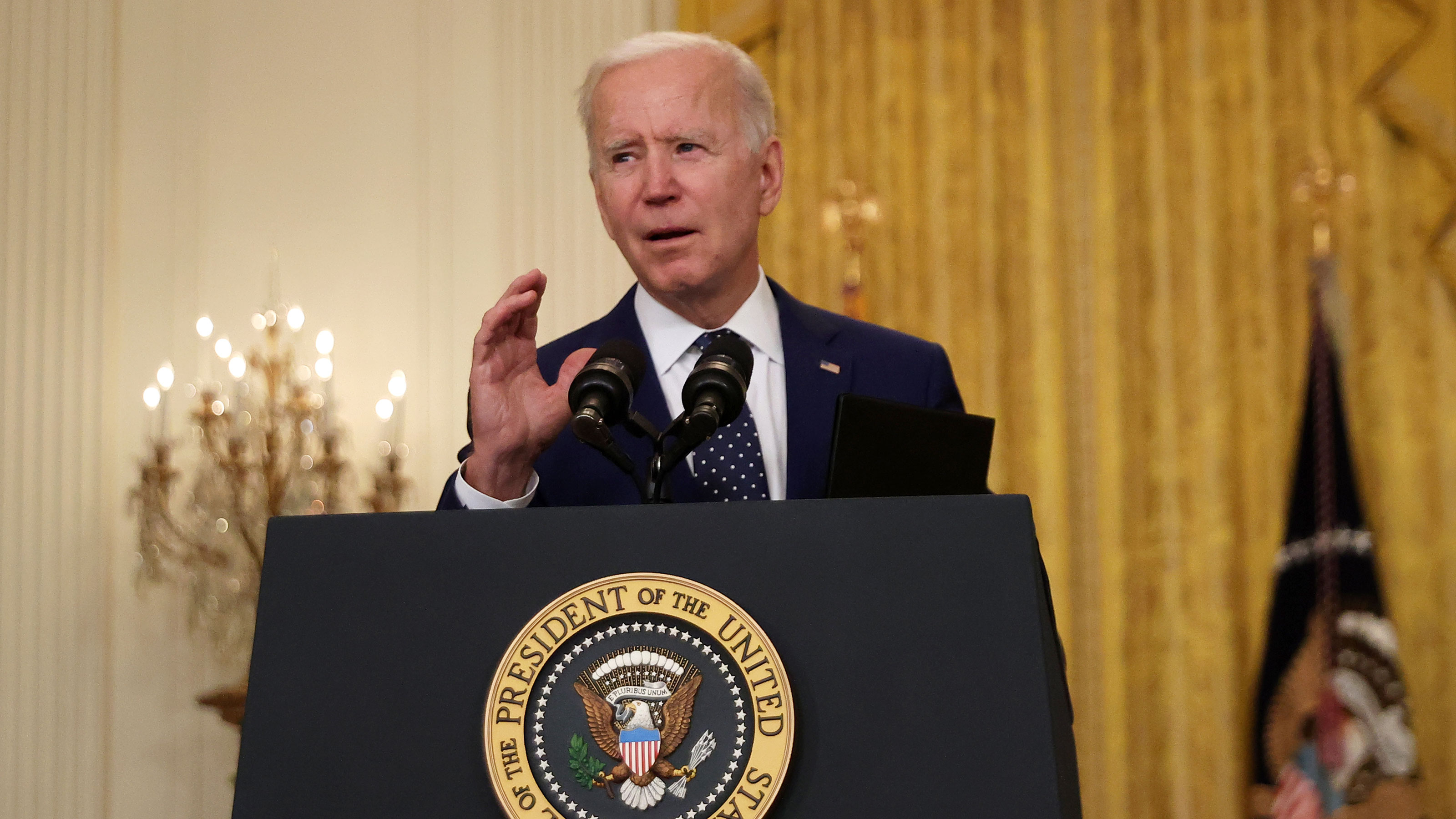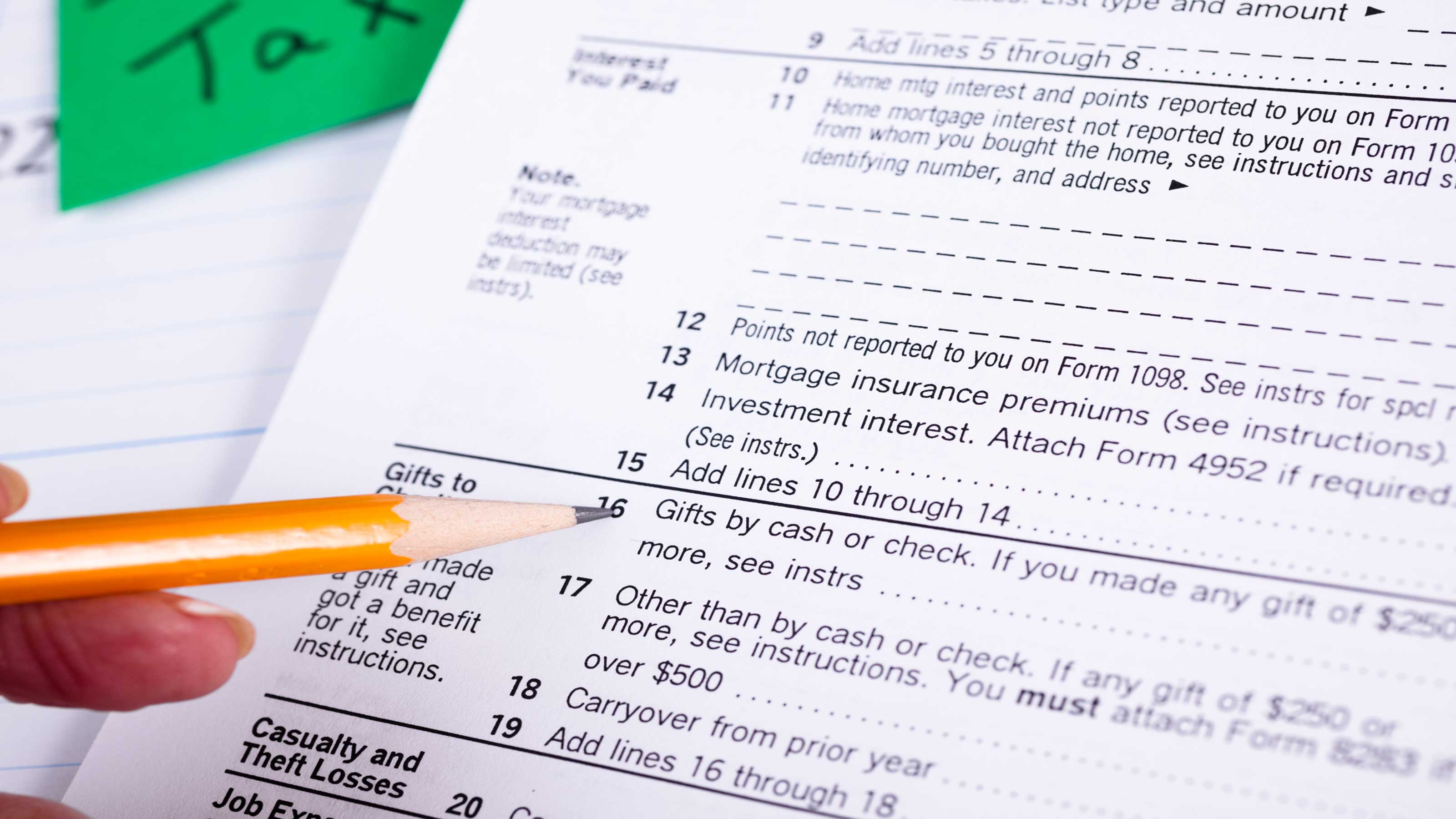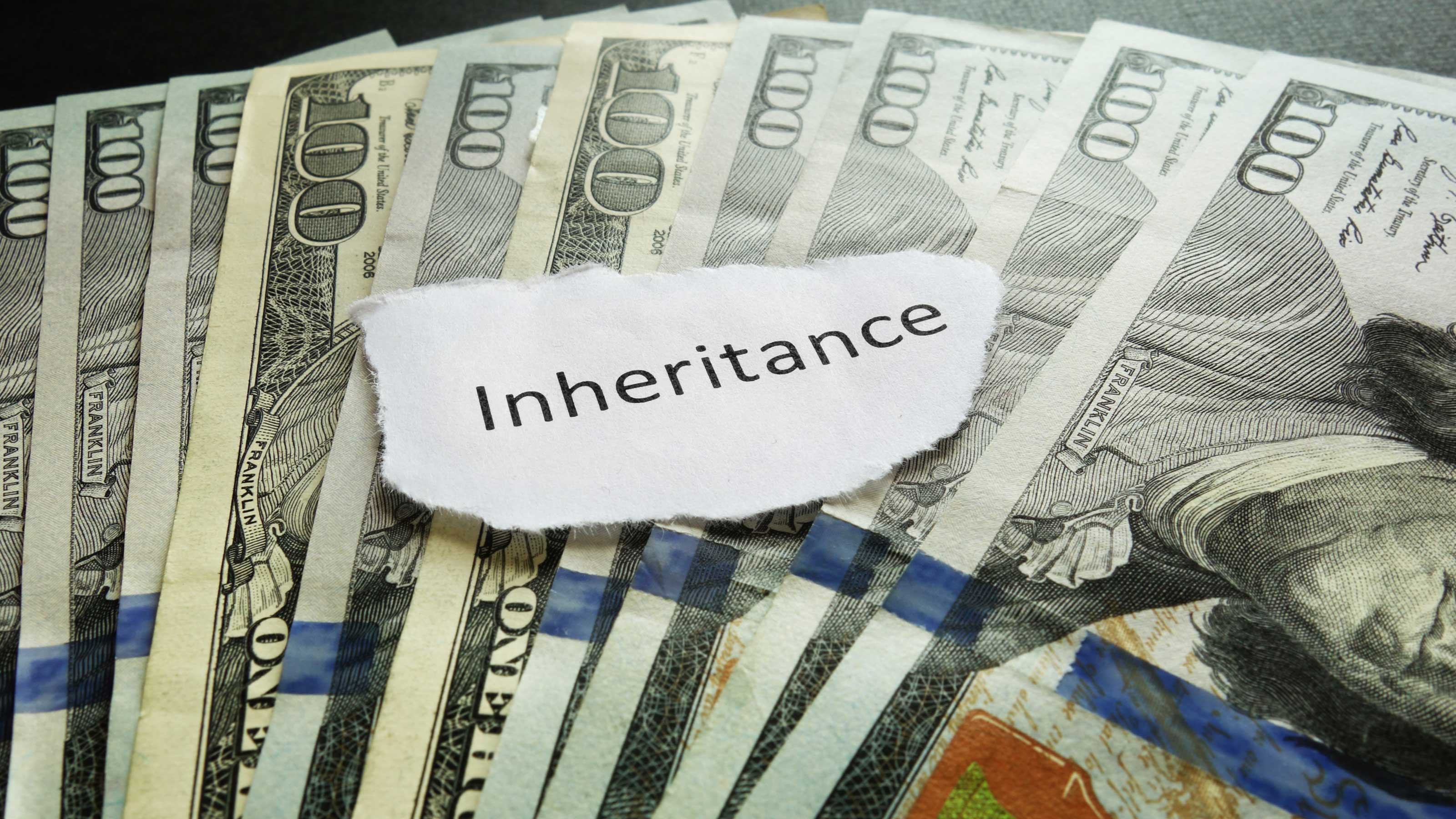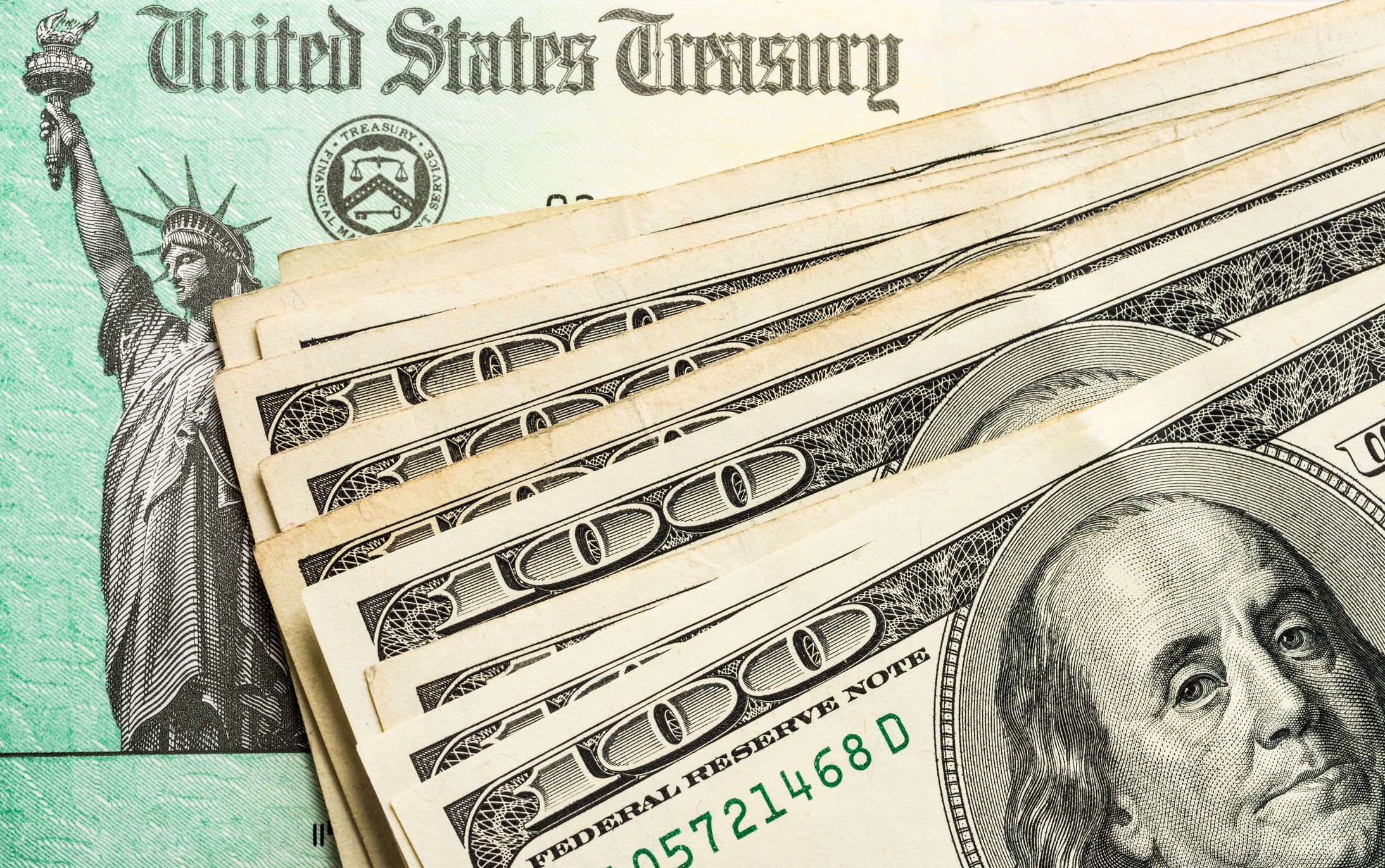Does President Biden Want to Raise YOUR Taxes?
President Biden's "social infrastructure" plan is expected to include tax increases for some Americans. Will you be one of them?


Profit and prosper with the best of Kiplinger's advice on investing, taxes, retirement, personal finance and much more. Delivered daily. Enter your email in the box and click Sign Me Up.
You are now subscribed
Your newsletter sign-up was successful
Want to add more newsletters?
With good reason, some Americans are worried that their tax bill is going to shoot up in the near future. During last year's campaign, President Biden wasn't shy about telling the American public that he will raise taxes on the wealthy. And it looks like he's about to release a new "social infrastructure" plan that's expected to do just that. But what, exactly, does he mean by "wealthy"? The president has repeatedly said he won't raise taxes on anyone making less than $400,000 per year. That appears to be a nice, clean, easy to understand dividing line between those who'll pay more taxes and those who won't. Unfortunately, though, it's not that simple.
First, it's not clear if the $400,000 threshold will be applied per individual or per family. If it applies to a family's overall income, a lot more Americans are going to see their tax bill go up. Also, regardless of whether the threshold applies to an individual or a family, some Biden campaign proposals could increase taxes on Americans who don't come close to earning $400,000 in a year. While the threshold would generally apply to income taxes and certain payroll taxes, the president has called for changes that would raise other taxes, too. People making less than $400,000 per year could get caught up in those other tax increases.
We also don't know when any proposed tax increases would go into effect. The economy hasn't fully recovered yet, and raising taxes on Americans before that happens (or close to it) could be risky. It will also be harder politically to boost taxes on individuals than it might be to increase taxes on corporations. As a result, we don't think higher taxes will apply for the 2021 tax year. Instead, look for them to apply in 2022 or perhaps even later.
Having said all that, let's take a look at some of the people who should be the most concerned about tax increases sometime during the Biden administration. Just remember that this isn't necessarily an all-inclusive list – other people could also face higher taxes over the next few years. We'll have a better idea of exactly who might see higher taxes soon once the president releases his "American Families Plan," but his campaign proposals provide a good starting point for making predictions now.

People Earning at Least $400,000
As we already mentioned, President Biden says he won't raise taxes on anyone earning less than $400,000 per year. But, it seems, it's open season for anyone making more than that amount. In fact, Biden has offered several tax proposals that would lighten the wallets of people earning $400,000 or more (again, we don't know for sure if that means any individual or any family earning over $400,000).
First, the president wants to raise the top individual income tax rate from 37% to 39.6%. In other words, he wants to undo what former President Trump's Tax Cuts and Jobs Act did back in 2017 (the TCJA temporarily lowered the top rate from 39.6% to 37% until 2026). For 2021, the following taxpayers will pay tax at the highest tax rate:
- Single filers with taxable income over $523,600;
- Joint filers with taxable income over $628,300;
- Married couples filing separate returns with taxable income over $314,150; and
- Head-of-household filers with taxable income over $523,600.
(For the complete 2021 tax brackets, see What Are the Income Tax Brackets for 2021 vs. 2020?)
It isn't clear if Biden will also try to adjust the top-rate brackets so that they start at $400,000. If he does, that would result in a tax increase for single, joint, and head-of-household filers making between $400,000 and the current threshold amount. Currently, they're not paying income tax at the top rate. If the threshold is moved up to $400,000 for married couples filing separate returns, that would result in a tax increase for people earning between $314,150 and $400,000, because they would be pushed into the highest bracket even though they aren't there now.
The president has also talked about making wages above $400,000 subject to the 12.4% Social Security payroll tax (half paid by the employee; half paid by the employer). For 2021, wages above $142,800 aren't subject to the tax (the amount is adjusted annually for inflation). However, instead of just imposing the tax on all wages, Biden may only want to add wages above $400,000 to the levy. That would create a "hole" in the tax – wages between $142,800 and $400,000 would not be taxed. The bottom threshold amount ($142,800 for 2021) would gradually increase through inflation adjustments, so the hole would eventually be filled, but that would take a long time to happen.
Small business owners earning $400,000 or more might also see a tax hike during the Biden administration by losing a valuable deduction. The TCJA added a 20% deduction for "qualified business income" from pass-through entities (e.g., partnerships, S corporations, and limited liability companies). The president has previously said he supports phasing out the QBI deduction for small business owners making more than $400,000 for the year.
TAX TIP: If you're worried about higher taxes in 2022, consider moving some taxable income into 2021 if you expect to earn more than $400,000 next year. For instance, think about shifting money from a traditional IRA a Roth IRA in 2021. You'll pay tax on the rollover amount now, but it'll be taxed at 2021 rates instead of at whatever rate is imposed when you withdraw the funds in retirement. If you own a pass-through entity, see if you can shift QBI into 2021 to get the full 20% deduction. Also, see if your boss is willing to move some of your salary or bonus money into 2021 to drop your wages below the possible $400,000 Social Security tax threshold for 2022 – both you and your company could save money.

Millionaire Investors
Wealthy investors would be affected by any plan to do away with favorable tax rates on capital gains. Currently, gains from the sale of stocks, mutual funds, and other capital assets that you hold for at least one year are taxed at either a 0%, 15%, or 20% rate. Wealthier taxpayers – single filers with taxable income over $445,850, head-of-household filers with taxable income over $473,750, and joint filers with taxable income over $501,600 – end up paying the 20% rate.
However, don't be surprised if President Biden's American Families Plan requires anyone making more than $1 million per year to pay tax on long-term capital gains at the top income tax rate for ordinary income. That's currently 37%, but don't forget that the president also wants to kick that back up to 39.6%. So, millionaires could potentially see a 19.6% tax increase on capital gains.
And let's not forget about the 3.8% surtax on net investment income (e.g., taxable interest, dividends, gains, passive rents, annuities, and royalties), which hits single taxpayers with a modified adjusted gross income over $200,000 and joint filers with a modified AGI over $250,000. Biden hasn't suggested doing away with or otherwise modifying this extra tax, which means investors earning $1 million or more could actually see their tax rate on capital gains soar to 43.4%.
A Biden plan to reform the Opportunity Zone program could cost wealthy investors, too. Under the program, you can defer capital gains from the sale of business or personal property by investing the proceeds in qualified opportunity funds (QOF), which in turn invest in economically distressed communities. However, QOFs typically require investors to have a high net worth, a minimum annual income, and at least a six-figure investment. As a result, these investment vehicles, and the tax breaks that go with them, are mainly for the wealthy. Among other things, Biden said during last year's campaign that he wants to make sure that Opportunity Zone tax benefits are only available if there are also clear economic, social, and environmental benefits for people living in the distressed communities.
TAX TIP: It might be time for millionaires to sell some of the stock or other capital assets they've been holding for a year or more, especially if they were going to sell soon anyway. If you're worried about higher capital gains tax rates next year, realize gains in 2021 and take advantage of the favorable tax rates while you still can. Tax-loss harvesting (i.e., selling assets at a loss to offset capital gains) might also help reduce your tax burden.

Itemizers
One of President Biden's campaign proposals that never received a lot of attention is capping the value of itemized deductions at 28%. Generally, the plan is to reduce the total amount of itemized deductions for anyone paying a marginal tax rate above 28% – that is, taxpayers in the current 32%, 35% and 37% tax brackets, or the proposed 39.6% bracket. For example, instead of itemized deductions for the wealthiest taxpayers being worth 39.6% (assuming that's the rate they'll pay under Biden's plan), that value would be capped at 28% and their itemized deductions would be reduced accordingly (similar to the itemized deduction limit that existed before the TCJA). In other words, instead of a wealthy person getting a 39.6% tax reduction for every dollar spent on, say, charitable gifts, he or she would only get a 28% tax reduction for every dollar donated to charity.
Note that the current 32% tax bracket applies to single taxpayers with taxable income as low as $164,926 and to joint filers with $329,851 of taxable income. As a result, limiting the value of itemized deductions to 28% could mean higher taxes for people earning less than $400,000. However, we could use some more clarity on this point. Unlike other income tax proposals offered during last year's campaign, Biden never specifically said this itemized deduction limit would only apply to people earning $400,000 or more (although the Washington Post reported last August that an unidentified Biden campaign adviser said the $400,000 threshold would apply to the cap). The cap might fall under the general "no tax on people earning less than $400,000" mantra, but we'd sure like to hear that from President Biden himself if this proposal makes it into his American Families Plan.
There's also another limit on itemized deductions that Biden talked about as a candidate. He wants to phase-out itemized deductions for people earning more than $400,000 for the year. Actually, this is simply a reversal of the TCJA's repeal of the so-called "Pease limitation" (named after Congressman Don Pease (D-Ohio), who drafted the tax code provision establishing the limit.)
TAX TIP: Increase charitable donations in 2021 if you expect to be trapped by these potential itemize deduction limitations next year or beyond. Think about opening a donor-advised fund if you want to get your tax deduction now, but spread out donations to your favorite charities in the future. Also, before the year runs out, try to prepay deductible expenses, such as mortgage payments and state taxes due in January.

Estates Over $5 million (and Their Heirs)
President Biden has also set his sights on lowering the federal estate tax exemption, which would subject more estates to the tax. In 2017, any estate worth less than $5.49 million was exempt from tax. Thanks to the TCJA, the exemption amount for 2021 is now up to $11.7 million (although the higher amount is scheduled to expire in 2026). Biden has said he wants to bring the exemption back down – by a lot.
We think the president will try to set the exemption amount to the pre-TCJA levels (i.e., around $5.5 million when adjusted for inflation). However, don't be surprised if he follow's Sen. Bernie Sanders' lead and asks for a reduction to $3.5 million (that's what it was in 2009). Nevertheless, assuming the exemption amount is only brought down to the pre-TCJA amount, that still means estates worth about $5.5 million to almost $12 million would suddenly be hit with the federal estate tax. For those estates, it's a tax increase – going from 0% in taxes to a 40% estate tax.
While this seems like a tax increase that only impacts the superrich, people of modest means can also be affected by the change. The estate tax is paid by the estate, not by your heirs. But that means that one or more of the beneficiaries are inheriting less than they otherwise would if no tax (or less tax) had to be paid. So, in effect, this tax increase is really an indirect tax on the people who inherit your property. And those people certainly could earn less than $400,000 annually.
TAX TIP: Giving away cash or property while you're alive can help you reduce or even avoid estate taxes when you die. The general rule is that any gift is subject to the federal gift tax. However, there's an important exception to this rule — you can give up to $15,000 per person during the year without having to pay any tax. If you're married, your spouse can also give $15,000 to the same people, jacking the annual tax-free gift up to $30,000 per person. And you can do that year-after-year without paying any gift tax unless the total of all your non-exempt gifts exceeds the lifetime limit, which is the same as the estate tax exemption amount. Plus, as long as your gifts stay below the annual limits, whatever you give away won't be counted for estate tax purposes when you die. So, for example, if the current value of your estate is above the federal estate tax exemption amount ($11.7 million for 2021), giving away assets now could drop the value below the exclusion amount, which would mean no federal estate tax when you pass away.

Heirs Inheriting Capital Assets
There's another way your heirs could be screwed by one of President Biden's expected tax proposals. He wants to eliminate the step-up in basis for inherited capital assets, which means more taxes on wealth passed to heirs.
Here's how the step-up in basis lowers taxes: Johnny's grandmother bought some stock years ago for $10,000. When she dies, Johnny inherited the stock – which is now worth $100,000. Johnny immediately sells the stock for $100,000. When you sell stock (or other capital assets), you pay tax on the gain – which is the amount you got when you sold the stock minus the "basis" (generally, the amount paid for the stock). In this case, Johnny's gain would be $90,000 ($100,000 - $10,000). However, when you inherit a capital asset, the basis is increased ("stepped up") to the fair market value of the asset on the date that the person who owned it died. So, in this case, Johnny's basis in the stock automatically jumps up from $10,000 to $100,000, which means he has zero gain because the selling price and the basis are identical ($100,000 - $100,000 = $0). No gain = no tax for Johnny.
If the step-up in basis is eliminated, Johnny is going to be paying tax on $90,000 of capital gain. Assuming Johnny isn't a millionaire (see above), at least he would still be able to take advantage of the favorable tax rates for capital gains since the gain from the sale of inherited assets is treated as long-term gain. But still, going from no tax to potentially paying a 15% or 20% tax is a tax increase for him. And, since Johnny's salary doesn't impact whether the stock basis is stepped-up or not, we can put this tax increase on the list of proposals that could hit people earning less than $400,000 per year.
TAX TIP: For certain people, a life insurance retirement plan (LIRP) might be something worth looking into if the step-up in basis for inherited assets goes away (or even if it doesn't). As the name suggests, a LIRP is a cash value life insurance policy that can provide some of the same tax advantages as a Roth IRA, such as tax-deferred growth and tax-free income during your golden years. Since it's a life insurance policy, a LIRP provides death benefits for your beneficiaries, too – and life insurance proceeds received by a beneficiary following the death of an insured person are generally tax-free. So, if you can't pass tax-free capital assets to your children or grandchildren, listing them as a beneficiary on a LIRP might be a good alternative method of providing for them after you're gone.
Profit and prosper with the best of Kiplinger's advice on investing, taxes, retirement, personal finance and much more. Delivered daily. Enter your email in the box and click Sign Me Up.
Rocky Mengle was a Senior Tax Editor for Kiplinger from October 2018 to January 2023 with more than 20 years of experience covering federal and state tax developments. Before coming to Kiplinger, Rocky worked for Wolters Kluwer Tax & Accounting, and Kleinrock Publishing, where he provided breaking news and guidance for CPAs, tax attorneys, and other tax professionals. He has also been quoted as an expert by USA Today, Forbes, U.S. News & World Report, Reuters, Accounting Today, and other media outlets. Rocky holds a law degree from the University of Connecticut and a B.A. in History from Salisbury University.
-
 Big Nvidia Numbers Take Down the Nasdaq: Stock Market Today
Big Nvidia Numbers Take Down the Nasdaq: Stock Market TodayMarkets are struggling to make sense of what the AI revolution means across sectors and industries, and up and down the market-cap scale.
-
 How Medicare Advantage Costs Taxpayers — and Retirees
How Medicare Advantage Costs Taxpayers — and RetireesWith private insurers set to receive $1.2 trillion in excess payments by 2036, retirees may soon face a reckoning over costs and coverage.
-
 3 Smart Ways to Spend Your Retirement Tax Refund
3 Smart Ways to Spend Your Retirement Tax RefundRetirement Taxes With the new "senior bonus" hitting bank accounts this tax season, your retirement refund may be higher than usual. Here's how to reinvest those funds for a financially efficient 2026.
-
 States That Tax Social Security Benefits in 2026
States That Tax Social Security Benefits in 2026Retirement Tax Not all retirees who live in states that tax Social Security benefits have to pay state income taxes. Will your benefits be taxed?
-
 Standard Deduction 2026 Amounts Are Here
Standard Deduction 2026 Amounts Are HereTax Breaks What is the standard deduction for your filing status in 2026?
-
 3 Popular Tax Breaks Are Gone for Good in 2026
3 Popular Tax Breaks Are Gone for Good in 2026Tax Breaks Here's a list of federal tax deductions and credits that you can't claim in the 2026 tax year. High-income earners could also get hit by a "surprise" tax bill.
-
 Five Ways Trump’s 2025 Tax Bill Could Boost Your Tax Refund (or Shrink It)
Five Ways Trump’s 2025 Tax Bill Could Boost Your Tax Refund (or Shrink It)Tax Refunds The tax code is changing again, and if you’re filing for 2025, Trump’s ‘big beautiful’ bill could mean a bigger refund, a smaller one or something in between next year. Here are five ways the new law could impact your bottom line.
-
 New SALT Deduction Could Put Thousands Back in California Homeowners’ Pockets
New SALT Deduction Could Put Thousands Back in California Homeowners’ PocketsTax Breaks The federal state and local sales tax (SALT) deduction cap is higher this year, and could translate into bigger savings for Golden State homeowners.
-
 Key 2025 Tax Changes for Parents in Trump's Megabill
Key 2025 Tax Changes for Parents in Trump's MegabillTax Changes Are you a parent? The so-called ‘One Big Beautiful Bill’ (OBBB) impacts several key tax incentives that can affect your family this year and beyond.
-
 Elon Musk and Most Taxpayers Don't Like What's in Trump's 'Big Beautiful Bill'
Elon Musk and Most Taxpayers Don't Like What's in Trump's 'Big Beautiful Bill'Tax Policy President Trump is betting big on his newest tax cuts, signed into law on July 4. But not everyone is on board.
-
 'Unprecedented' Private School Voucher Tax Credit in Trump's Megabill
'Unprecedented' Private School Voucher Tax Credit in Trump's MegabillTax Credits The so-called ‘One Big Beautiful Bill’ is now law, and one provision calls for a major tax break for private school donors.

